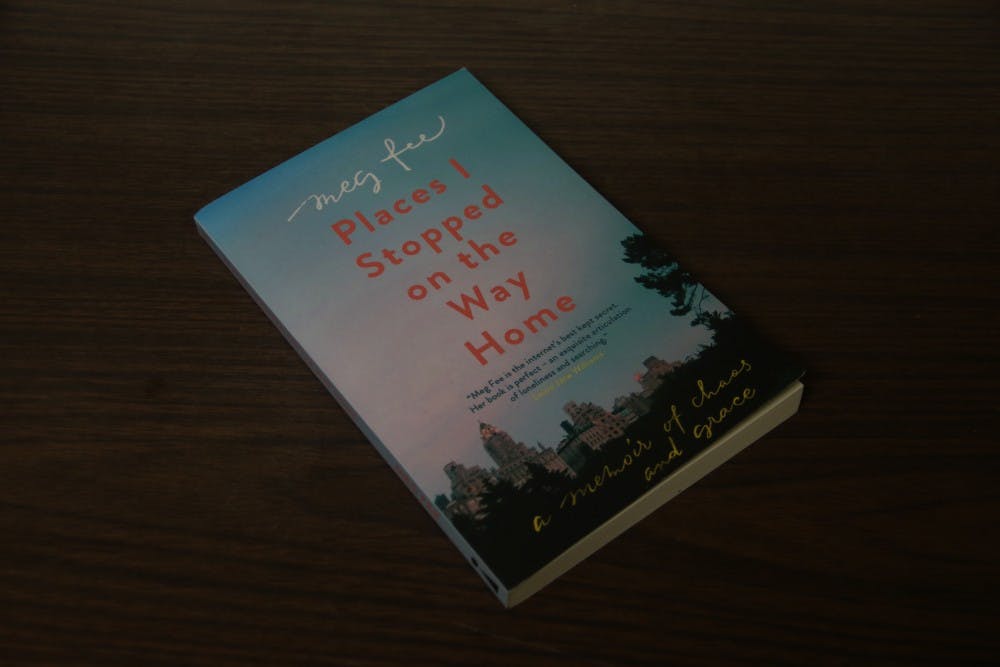Meg Fee graduated from Julliard’s actor training program in 2008. After a decade of living in New York City, she is pursuing a Master’s in Public Policy at Duke. And now she’s written a book.
On Sept. 20 at 7 p.m., The Regulator Bookshop will host a reading and signing of Fee’s book, released in May: “Places I Stopped on the Way Home: A Memoir of Chaos and Grace.” The book chronicles Fee’s years in New York City trying to find her way.
The memoir began as a collection of essays that Fee published about two years ago as an e-book, titled “Letters to Men I’m No Longer in Love With.” A representative from Icon Books then reached out to her following its release. Fee signed with the Diamond Kahn & Woods Literary Agency, changed the title of the book, and added more stories.
Although much of the book is about the various men Fee had relationships with, the underlying thread is one of finding place, finding home and finding herself. She titles each chapter with its location — Lincoln Center, 118th Street, Manhattan Avenue — evoking a constant searching.
Fee also shares the struggles of her eating disorder. She developed binge eating disorder in her senior year at Julliard in 2006, but was not diagnosed until 2008. At that time, it was called a “nonspecific eating disorder,” as binge eating disorder was not recognized by the American Psychiatric Association in the Diagnostic and Statistical Manual of Mental Disorders until 2013.
“Part of why I started writing is that I felt like I was living a story that wasn’t mine,” Fee said. “For all intents and purposes, the eating disorder had co-opted my story.”
She now can speak about and write about the experience, but it was difficult then. Fee said her parents were very supportive of her throughout the recovery process. It was hard on all of them, though, because there were some things she had to deal with on her own. Writing allowed her to let them in — she was able to write about her experiences before she was ready to talk about them with anyone.
“It is still, I think, an incredibly shameful story,” Fee said. “An incredibly shameful experience. And because of that, women, and men, don’t talk about it. And because they don’t talk about it, doctors don’t know as much about it as they could.”
This health crisis is now one of Fee’s passions — notably, the de-stigmatization of weight, women’s health and mental health issues.
Fee spent the past summer working for Cora, a subscription organic pad and tampon service that advocates and partners with women’s health, education and equality organizations in Kenya and India. She worked on a project in which she talked to 15 different women and asked them about when they felt valued. Every interview ended with the question, “Do you like being a woman?” Every woman Fee spoke to said yes.
“I became really interested in [that] women feel this really inherent worth, they feel valuable, and yet a lot of the policies that we’re seeing don’t reflect that value that women feel they have,” Fee said. “And it sort of occurred to me — now it’s so obvious — of course those policies don’t exist because women aren’t at the policymaking table. Not in the same way that men are.”
The numbers bear this out: 23 of 100 U.S. senators (23 percent) are women, while only 84 of 435 U.S. representatives (19.3 percent) are women.
She decided to come back to school in the lead-up to the 2016 election and hopes to find ways to bring more women to the policymaking table. At the time, Fee was working in a finance company, and to her it felt like she and her coworkers were “working really hard to no end.” She started to realize that to her, voting was not enough.
“That shouldn’t be the first thing I do to exercise my democratic rights,” Fee said. “I should be participating in the democratic process far more often, far more frequently, and that when I choose to vote, that’s the last thing, that’s the last step.”
Besides working for three different finance companies, Fee has also been a caller for the Metropolitan Opera, worked for a cosmetic company during special events and worked in two different restaurants. None of the jobs had much, if anything, to do with her skill set, but her 20s were still a period of “intense emotional personal growth and development.” Fee said the best thing she did in that decade was develop a value system.
“I look back now, and my value system is that I do not define myself in terms of how other people define me, least of all romantic partners,” Fee said. “The tension there was that I was living in a way that I was trying to please them, trying to make myself smaller, trying to do all these things that didn’t align with the person that I wanted to be.”
She spent so much of her time looking for the right person, but Fee wishes she had spent more time and energy in other pursuits. She wishes she had taken more risks, submitted writing samples, applied to graduate school sooner. But she has learned from her experiences and hopes that other people will gain something from reading about her experiences as well.
“Life and sadness and health, it’s all much more textured than we give it credit for,” Fee said. “Life is a complicated, nuanced experience, and that is the feature, not the bug.”
Get The Chronicle straight to your inbox
Sign up for our weekly newsletter. Cancel at any time.

